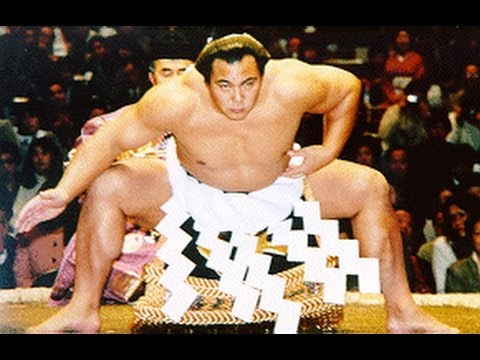The king of the ring

source: youtube.com (labeled for reuse)
One thousand forty-five career victories. Ten years in the top ranks of sumo. Fifty-three consecutive wins in 1988. Eight hundred seven victories in the top makuuchi division. One hundred eighty-three centimeters and 127 kilos of pure talent. Chiyonofuji Mitsugu, known as The Wolf, managed to break many records in sumo wrestling despite his relatively small body structure, winning more tournaments in his thirties than any other wrestler. Throughout the 1980s and the early 1990s, no one in sumo could match Chiyonofuji’s skill, agility, and strength.
Born Mitsugu Akimoto in Hokkaido, Japan in 1955, Chiyonofuji got his “ring name” from those of two previous yokozuna—wrestlers who have been awarded the highest rank in sumo—Chiyonoyama and Kitanofuji. Although his stature and shoulder injury put him at a disadvantage, Chiyonofuji was invited to join the Kokonoe stable of sumo wrestlers in Tokyo. There, he excelled, quickly improving in speed and strength. He became the 58th yokozuna in 1981 after winning two successive tournaments. Eight years later, he won his 968th career fight, beating the record and receiving a National Medal of Honor.
Inside the ring, Chiyonofuji appeared to have a mental advantage over his adversaries. According to The New York Times, he was known as “The Wolf” for his solitary habits, and because he would “dump his opponents out of the clay ring and then pause, for an electric moment, to glower over his beaten foe.” Chiyonofuji differed from his opponents who, weighing as much as 236 kilos, centered their tactics on force. Extremely focused, he would take advantage of any of his adversaries’ minor concentration lapses to flip his “giant foes…out of the 15-foot-wide ring” with “muscular, ballet-like grace.” Whether he won or lost, he almost always left the arena displaying little or no emotion.
This does not mean, however, that The Wolf did not excel over his opponents physically. Throughout his career he used more than 41 different wrestling techniques, in particular the overarm throw, uwatenage. In fact, his use of this trademark strategy was so effective it was nicknamed the “death grip.”
On May 12, 1991, nearing the age of 36, Chiyonofuji was defeated by an 18 year-old sumo sensation named Takahanada. He retired two days later. “I have reached my physical limit and lost my vitality,” he said. “Last November I knew that I had reached my limit, so I was ready to retire.” However, he remains active in the sumo world as head of the Kokonoe stable, the same stable he trained in.
Chiyonofuji practically has rock-star status in Japan, and he is venerated by sumo enthusiasts everywhere. I wondered, though, if even those who aren’t familiar with him can sense his reputation and the authority he commands. To do this, I showed Graded students a video of his 1000th victory against sumo wrestler Hananokuni. These were their reactions:
Mariana Lepecki: I thought that it was interesting how, even though it was his 1000th victory, he didn’t really display any excitement, which shows how focused he was.
Daniel Almeida: While I’m not a sumo wrestling expert, if I had to bet on one of them winning, I’d put my money on the larger guy. To see Chiyonofuji win was delightful and surprising, as it goes to show how amazing he was.
Adam Fertig: He seems pretty chill.
Kevin Bengtsson: Whoa. Whoa, man! Whoa! That was super intense. One thousand victories… That’s more than 999 victories, man. An astounding feat. That inspires me to aspire to a goal of my own: live to one thousand years of age. I hope I can do it!
Pedro Qurino: That was his reaction?! He should have been much happier. A thousand victories is an amazing number. But his reaction is understandable; he is used to winning.
Isa Bruder: I am staring at the screen in a very confused manner and trying to understand what is going on, but I think it is interesting how the crowd seems more excited than Chiyonofuji. I would think he would be the most excited to win.
When interviewed after his 1000th victory, Chiyonofuji affirmed that his next goal was to win match 1001. He achieved this and much more, since his prowess and mental resolve are visible and inspirational. This all goes to show that, while he no longer competes, The Wolf will always be a champion.
Sources: nytimes.com; archive.metropolis.co.jp; youtube.com

This is Clara’s second year with The Talon, and she is now editor of the Features Team. She enjoys jumping rope and bumping into things, but does the...








